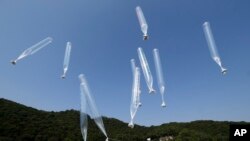South Korean activists have sent anti-Pyongyang leaflets into North Korea amid heightened tensions over North Korean threats regarding a long-range rocket launch and nuclear test.
Park Sang-hak, a North Korean defector living in South Korea and leader of an activist group called Fighters for Free North Korea, said his group sent balloons containing some 200,000 leaflets that were critical of the North Korean regime across the border on Sunday.
Park told VOA the leaflets were a warning to North Korea over its recent threats. He added his group will continue sending anti-Pyongyang leaflets to North Korea until Pyongyang stops provocations.
South Korea’s Unification Ministry said Monday the government will not stop the leaflets, saying the activity is irrelevant to the recent inter-Korean deal. The agreement calls for the two sides to reduce tensions and promote dialogue and exchanges.
Ministry spokesman Jeong Joon-hee said, “It is the government’s position that the activity can’t be forcefully stopped as it is an act of free speech. ”
Jeong also told reporters the government will take the necessary steps if the activity threatens the safety of residents near the border.
North Korea Reaction
North Korea strongly opposes such balloon launches. Last October, North Korea fired at some of the balloons carrying leaflets, triggering a brief exchange of fire with South Korea.
Some analysts in Seoul are speculating that North Korea may use the balloon launches as an excuse to delay talks with South Korea.
Last week, North Korea said it plans to launch a “series of satellites” into space and announced that it has restarted its nuclear facilities.
Speaking at a forum in Beijing, China’s Foreign Minister Wang Yi said on Saturday all parties in the North Korean nuclear talks should refrain from any actions that could worsen tensions on the Korean peninsula.
Earlier, U.S. Secretary of State John Kerry warned North Korea of “severe consequences,” vowing to put pressure on the communist country.
Jee Abbey Lee contributed to this report, which was produced in collaboration with the VOA Korean service.




